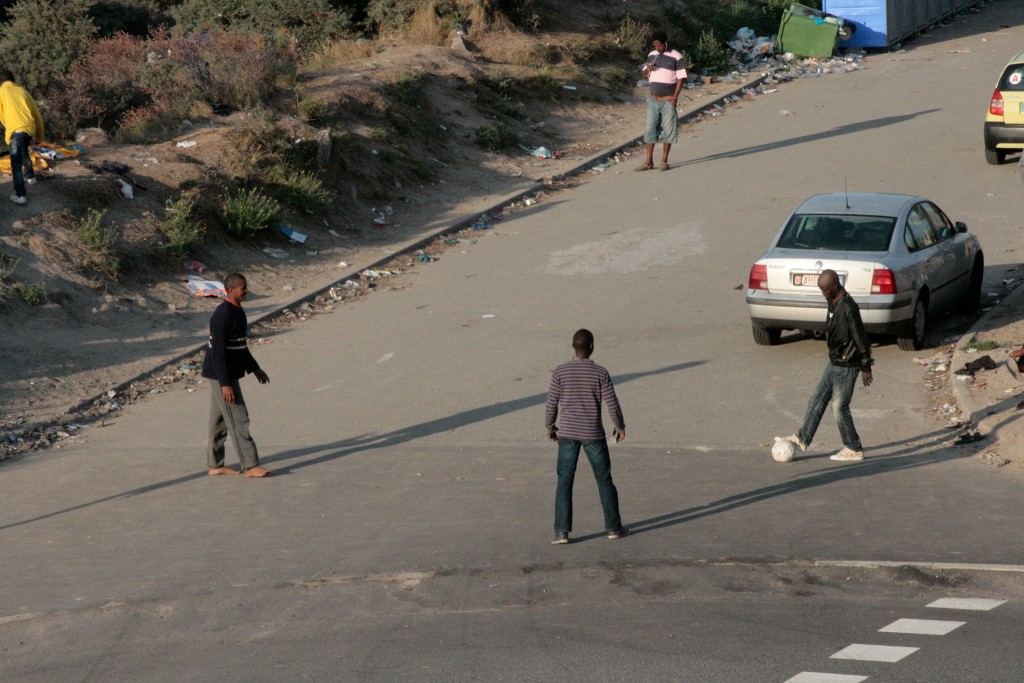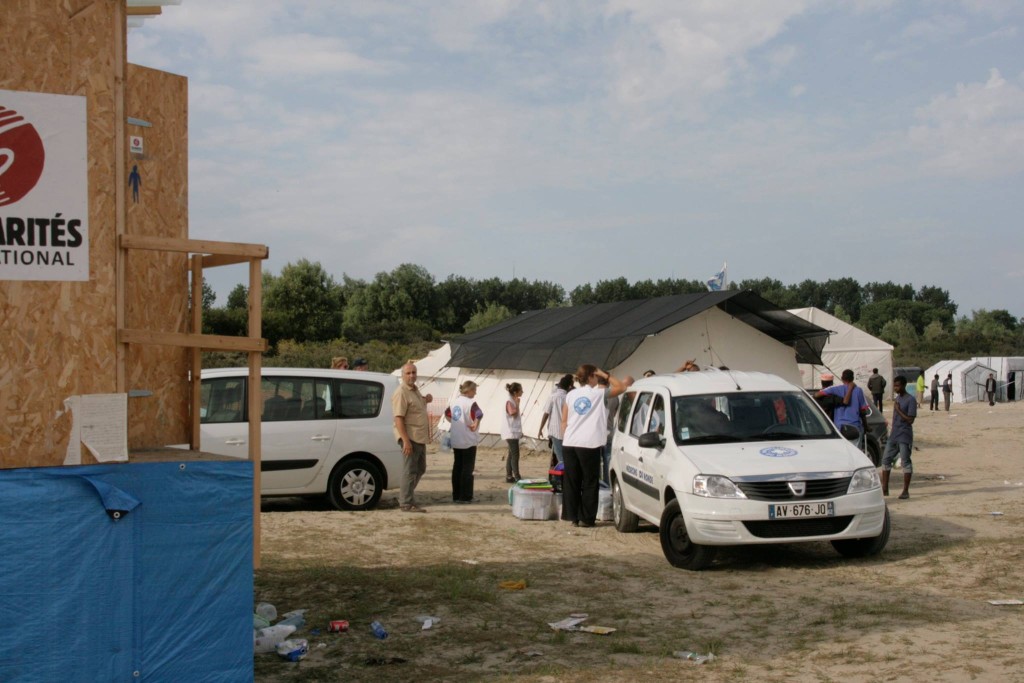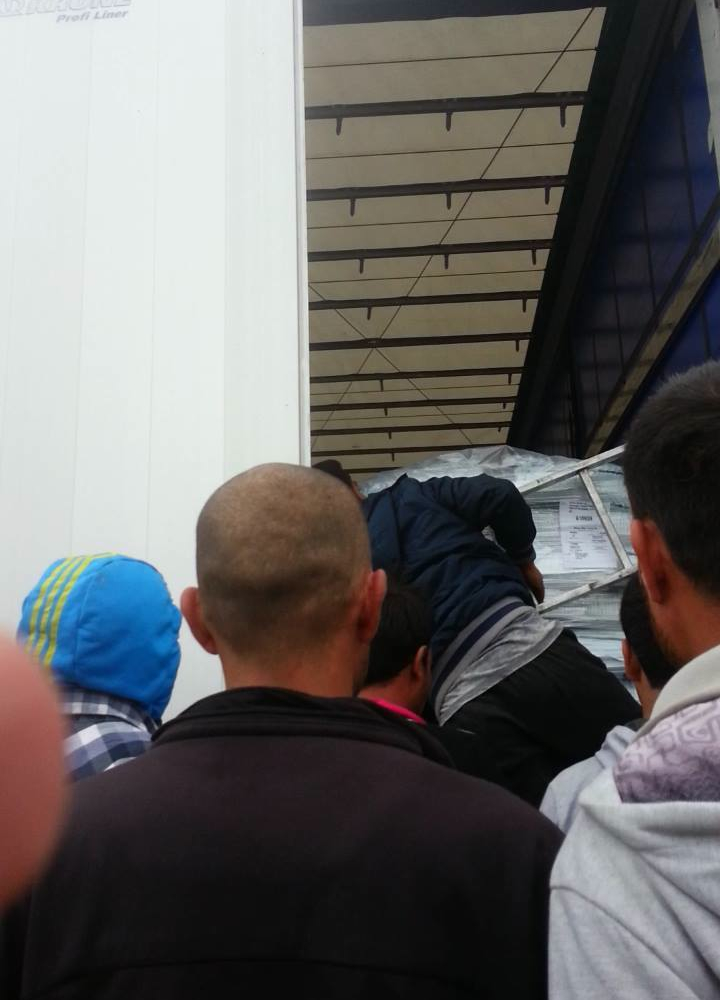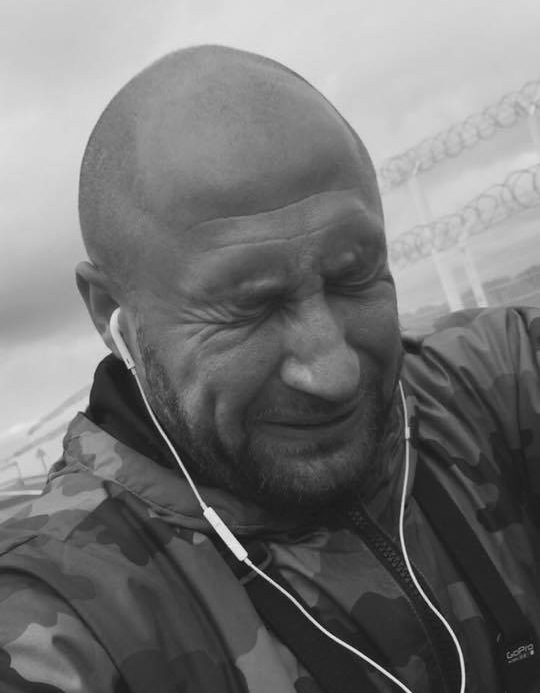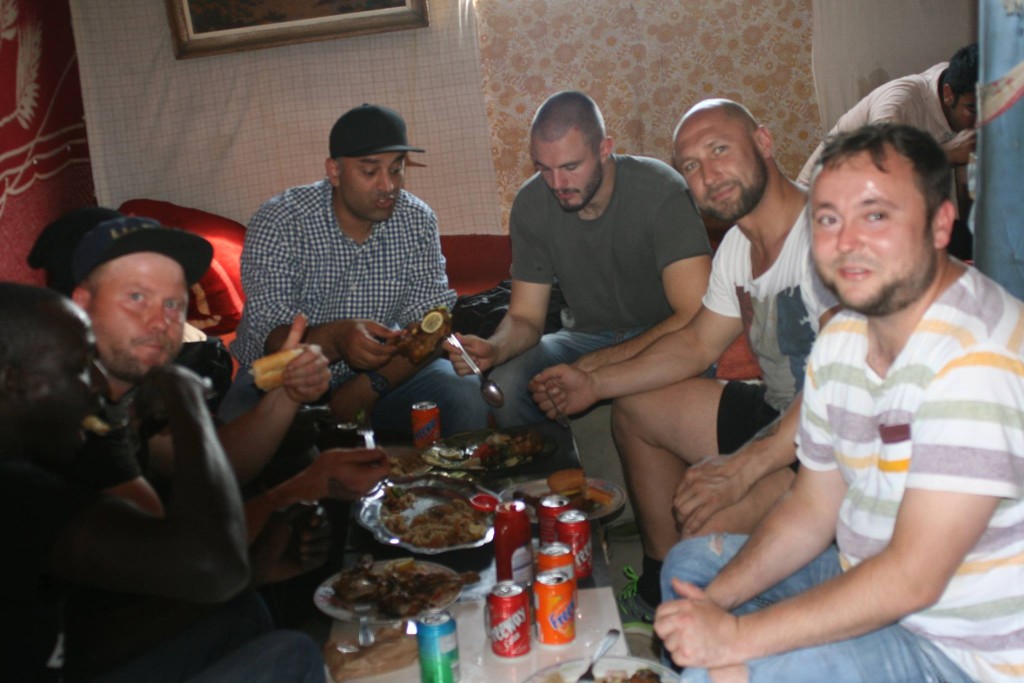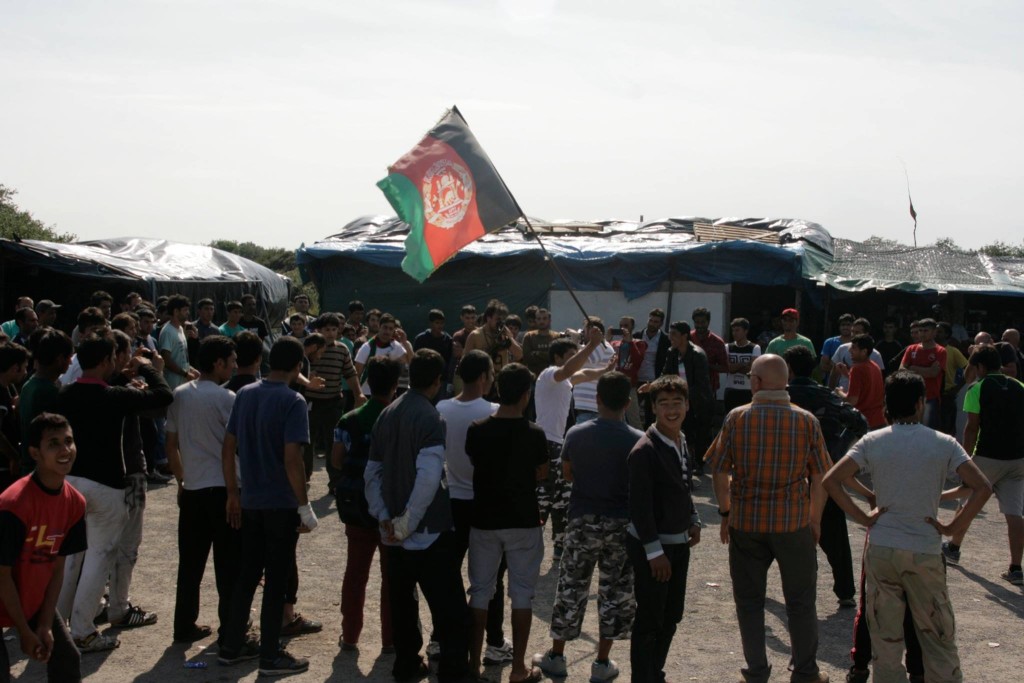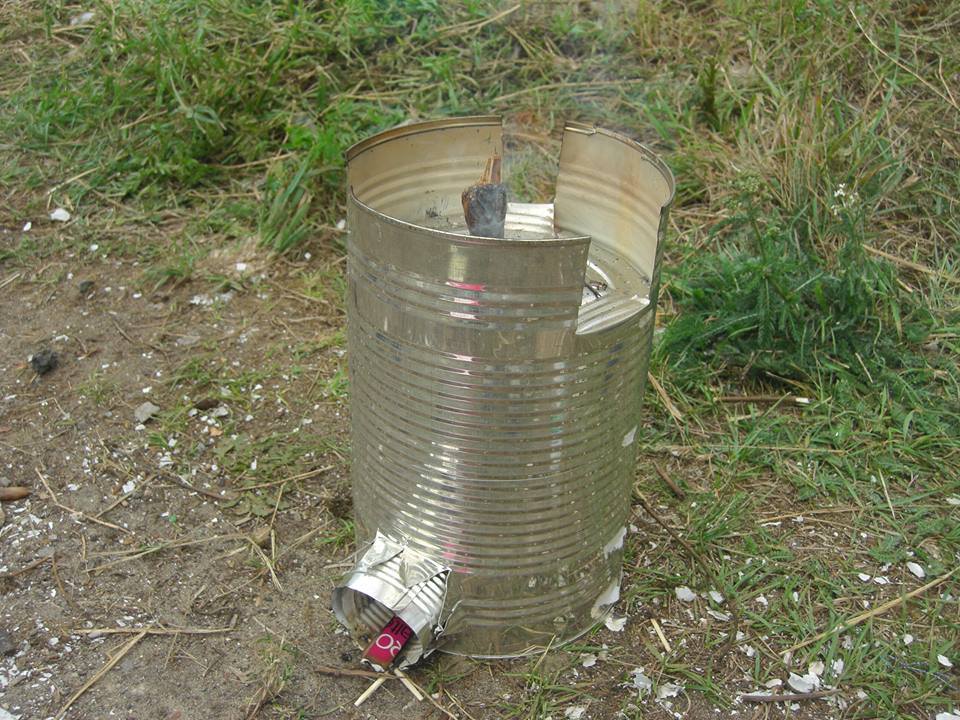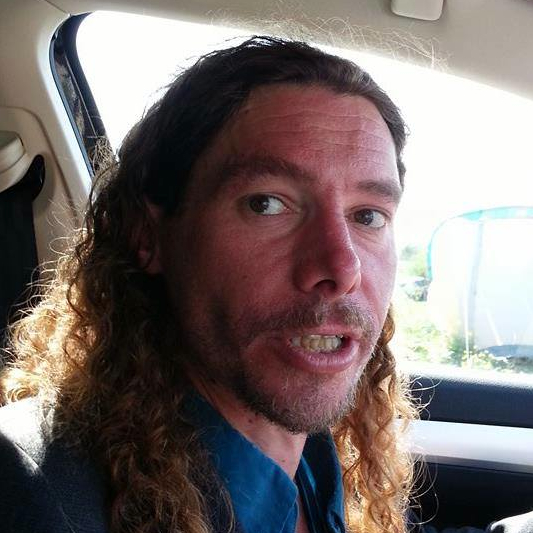Klicke hier für die deutsche Version.
It is about half ten and I am sitting in one of the small bakeries on the seafront. I have agreed to meet the guys from Hamburg here at 11. They will arrive shortly and pick me up in their car. When the dark VW estate arrives outside the bakery, I suddenly am not as much in a rush as I was a few hours ago. Whilst we are driving we introduce ourselves.
Jarek Duda is in the process of making a docu about the Camp. He wants to develop as a film director. So far, Jarek is better known for his unusual rap videos. His cameraman Leo is from Düsseldorf. Leo is one of those tall, polite and handsome students who all the girls at Uni fall in love with. At 24 he has already completed his editing degree and is now becoming cameraman. The third man is Sebastian. It’s hard to describe him. At first glance he looks in top condition. He is overly friendly and helpful. Whatever his task is here in this team, Sebastian is certainly the driving force. He is a typical dynamic person and his energy will not wane in the following days, with only one exception.
After a cup of tea in the town centre we drive directly to the Camp. On the way there the guys tell me that they had barely been in Calais 3 minutes at the point of our meeting. I notice that Sebastian is looking at me questioningly in the back mirror, as if he was thinking the same as I. It was never a coincidence! I believe in things like fate or premonition. That’s why I also believe that it was meant to be that we share our journey together. These guys are here to do something special, I am thinking. That’s why I want to support them as much as I can.
Arriving at the Camp, we meet some Sudanese boys playing football. Sebastian just leaves the car standing there in the road so he can join in. I sit down on a large rock to watch. There are about ten boys playing there with a battered ball. Sebastian is already one of them. Has Sebastian seen that one of the refugee boys he is kicking about with is not even wearing shoes? Did he notice the officials stand at the top of the bridge? Do these officals have children? Do they really, at the end of the day, want to get to know these kids, like Sebastian here?
Leo signals to me to come with him into the Camp. He and Sebastian tell me about their last visit and I introduce them to Eli and my other friends. We pass the volunteers and try to get an interview. The people from the medical department in the Camp try to assist and care for the refugees as much as possible. They do important and serious work which is very time-consuming. That’s why they seem a bit annoyed when we ask them for a few statements, just like all the reporters before us.
I didn’t realise how many journalists I was going to meet here in Calais. In the last few days here I have met press teams from Brazil, Japan, Korea, Canada, Sweden, Italy, Greece, the Check Republic and Ireland. You can understand why people get tired of being photographed like animals in a Zoo.
Some photographers and cameramen just went and unpacked their equipment and walked about the Camp filming and photographing. With one English journalist that literally backfired. The policemen who stand along the fence in the direction of the motorway are only there to secure the motorway. They don’t interfere if there happens to be a journalist on the horizon getting himself beaten up. Mostly it’s his own stupid fault anyway.
„I am not animal!“
There are some situations though where the police do interfere. There is a code word in the Camp. “Dugar”. A dugar is an opportunity. Very specifically, the opportunity to get to the UK in, or on top of, a lorry. This is the code the refugees use in the Jungle when there is a traffic jam on the motorway alongside the Camp. That’s when everyone runs up to the motorway to somehow jump on the lorries. Just as they are doing right now. It’s always an unbelievable scene. Both policemen who were only just then standing upright to sternly refuse access to the motorway, are suddenly so insignificant and small compared to moments ago when they looked so bully-ish.
Hundreds of refugees now run past me through the Camp. “Dugar, dugar!” they are all shouting, full of hope. To experience this for real is indescribable. A bit like when we were young attending a football match and the police were after us. Only this is not a game. People are prepared to risk their lives in order to immigrate into the UK. Some have already suffocated inside the lorries’ hold. They run and shout “Dugar! Dugar!”: A traffic jam on the motorway. They leave everything behind in order to get to the much desired island in one of the heavy goods vehicles.
Hundreds of refugees run and shout “Dugar! Dugar!”:
A traffic jam on the motorway.
Sebastian pulls me out of my little Nirvana and shouts for me to follow him. We run together with the refugees up the embankment towards the motorway. There are probably already a hundred HGVs in the jam. The HGV drivers are helpless. Each lorry is opened up. The refugee first look at the delivery notes stuck on the freight inside the HGV’s hold. If it says UK, the first start to climb in.
The seriousness of the situation forbids us filming what we witness; there can be no gamble at the expense of the refugees. We pack away our camera gear and decide wordlessly to help people onto the lorries’ holds. Amongst them are countless children and women.
Suddenly, everything falls silent. What’s going on? We run to the front of the traffic jam. There is a stand-off between hundreds of refugees and around 100 border police. ‘Gendarmerie’ – police force. The refugees chorus the slogan, over and over: “We are not animal!” The officers stand there unmoving and let the refugees demonstrate there on the motorway for around a half hour. The traffic jam is getting longer, on both sides. So I walk along the jam in order to interview a few drivers. Right at the back, an English motorcyclist tells me that if it were him, he would do it exactly the same way. He rides along the motorway every week and sees the Camp, which has expanded into the Jungle over time. Nobody should have to live like that, he says.
In this Jungle there are no wild animals. There are human beings living here who have a human right to freedom and a secure life just as everyone else. They just haven’t been lucky enough to be born into a wealthy country. From the front of the queue there can be heard the increasingly loud voice of a woman. I interrupt my interview with the biker to get back to the demo. Arriving at the front, my suspicion is confirmed. An injustice is about to happen any moment.
The police is busy shaking up teargas bottles to use on the demonstrators. By now there are not just officials and the refugees on the road. A lot of journalists and cameras are there. A few of the volunteers have also dared to come onto the motorway. Two boys cycle past me on their bikes. In their home country it is most likely not forbidden to ride a pushbike on the motorway. Through the radio transmitter of one of the officials next to me I hear a last warning going out to the people here. Then all hell breaks loose. The officials fall into formation like Roman Legionaries and walk behind their shields towards the demonstrators, alternating their steps with a single beat on their shields.
The first blow is directed at my mobile. I was trying to film his beatings. The second blow is to my left hand. And the third I feel is to my stomach, soon after that.
Suddenly, things happen very quickly. They just start blindly battering people. They beat me up, too. I keep forgetting they think I am an refugee, too, because of the way I look. An official sprays masses of teargas into the crowd. It’s getting louder. The situation gets out of control. The police are using more and more force. An refugee just lies down on the ground. He is overcome with too much teargas. Before my eyes he is roughly torn by his clothing towards the shrubbery alongside the road and pushed off the top. I feel the rage rising in me. I had no intention of joining the crowd again. I didn’t want to get beat up today. But after that scene the devil on my shoulder won.
I move off the motorway to re-join the refugees from the rear. There are 98 light-skinned and 2 dark-skinned officials standing there. One of the dark skinned officials is beating up one of the Africans standing in front of him. I try to confront him. No chance. He wants to get me out of the way. I scrutinise him. He is at least 6ft 3” and looks well-groomed. His beard and hair are cropped short. The human beings whose heads and ribs he keeps beating and poking with his baton would probably also like to look like him. That’s what I try to tell him. Nothing more. I scream at him.
„These are your own people. Stop beating them!“
He stops and turns around to me. The first blow is directed at my mobile. I was trying to film his beatings. The second blow is to my left hand. And the third I feel is to my stomach, soon after that. It’s not so bad. I can take it. The others had to suffer a lot more. I think of my passport. In a situation like this it is completely useless.
Down below at the motorway bridge, Victoria, a volunteer from the Camp, runs past me. She is crying, holding her hands to her face. One of the officers has sprayed her with teargas, other volunteers and the guys from Hamburg were also not spared. Police don’t see human beings any longer; they are just doing as they are told.
Victoria tells me on the way down from the embankment that she is from the UK and has a few days off. She just wanted to come and do something useful for the refugees. She doesn’t mind the gas, if only it saved one of the refugees. Victoria is a tattoo artist from a small town on the South Coast of England. When I listen to her story, I laugh but she looks at me sadly. I wipe the tears from her face and give her a hug.
Suddenly, Sebastian is walking towards me. He is moving only very slowly. I am not used to that from him. His face is a bit swollen. I saw him earlier near the teargas. He was around the weaker ones all the time and tried to protect them. In all the time we have been here, Sebastian has been acting completely selflessly on behalf of the refugees. Now he needs help himself. It’s scary to see him like this. In order to try and help him I attempt to get up. But he won’t have it. He sits down next to me and bursts into tears.
‘It’s so unfair. He didn’t deserve that’, says one of the refugees who start to gather ‘round us at the bottom of the bridge. He had seen Sebastian up there himself. He goes up to him now to shake his hand. More and more refugees come up to us and sit down.
The things they say about Sebastian then, in the following minutes, are usually what people say about angels.
The things they say about Sebastian then, in the following minutes, are usually what people say about angels. – Really, it was a very ugly scene that occurred up there. But what is occurring here between a couple of dozen human beings, is pure friendship. And friendship can’t be limited by anything and can therefore never be ugly. I feel completely at ease amongst all these people. Now, we are all equal.
At this point I think again about all my friends who advised me not to go on this journey. I am so happy to say I didn’t doubt my decision, not even for one second. My understanding here grows by the minute. I’ve only known Sebastian for less than 24 hours. But I feel closer to him than I feel to others after 24 years. With him, I am certain that he is a friend.
Leo and Jasper come and join us to say that nobody got spared the teargas. We filmed the police covering people in gas. We will also not spare them the exposure in our documentaries when it comes to finding out the truth. It was violence exercised by police force. We are walking along again through the Camp. Some of the refugees join us. They give us the feeling that we are their guests, and that we are welcome. Through the incidents on the motorway, many of the refugees see us as their friends now, not just journalists hot on the trail of the next lurid photo. With that strength we are visiting the Afghans. The Afghans, we are told, won’t have their photograph taken. By nobody.
They have set up a real restaurant there. Although it is wood patched together with plastic like everything else here; but that has no bearing on the smell and taste of their dishes. We step into the restaurant, seduced by the aroma of the Persian cuisine and mad about trying out an authentic meal. It’s Jarek’s treat. For a complete meal including meat, rice, salad and drink it comes to a paltry 4 Euros. In Germany we would pay so much more for such a tasty treat.
Whilst we wait for the food, we are getting into a more and more intricate conversation with the owner of the restaurant. He explains that he doesn’t give interviews because his people are constantly misrepresented in the media. Jarek asks him to say exactly that, to the camera. Ali, that is his name, who is an engineer for something back in his home country, consents.
Now we are allowed to photograph and record. Whilst Ali is preparing the food for us, he explains the situation of his people. The way we behave gives him more and more trust. After the meal he approaches us and invites us to take part in a special feast laid out by his people in an hour’s time, so we can take some photographs there. With an Afghan flag in their hands, around 150 people dance in a circle before the restaurant an hour later. I know the dance from my Afghan friends in Germany. But never before have I seen people dance so freely under such oppressive circumstances. I will never forget this moment. Of around 200 photos I take, each and every one comes out brilliantly.
One thing I have learned in the Jungle with pleasure. Normally, if you meet some new people, 95% of the time you kind of drop them again a few months later because they really don’t match up. It’s not like that in the Camp. You save yourself that phase of getting to know each other. I did not experience one single disappointment with regards to getting to know people there. The best people though who I had the pleasure to meet, were the volunteer helpers who got there off their own backs.
Victoria is a young student with fabulous red hair. She is from the Saarland area in Germany. In order to do her masters in Architecture she studied at the Delft University in Belgium. Victoria has designed a kind of rocket stove. This consists of a large and a small tin can. The small can fits into the larger one like a sort of chimney.
In this, the refugees can burn wood when it gets cold in the winter. You can even cook with it. Victoria doesn’t have much money to help. But she had a really good idea to contribute.
Drew is English, a teacher from London. In his free time he comes to the Camp to teach English to the refugees. In a short interview I tried to convince Drew to make a statement about David Cameron or the police force. But he remains very matter-of-fact and limits his talk strictly to those things he can influence himself.
Bill is also English, he studied biophysics. Bill links people in the Camp with people outside the Camp. At present, he is attempting to bring universities together for the cause of the refugees.
There are many more here in the Camp who help voluntarily. Most of them come from somewhere in Europe without having a lot of money. Somehow they all manage. Some citizens of the regular town Calais support the volunteers a little by offering couch-surfing and the like. It reminds me somehow of the punks in my youth. They somehow managed to do lots without dosh. And the punks were always good to us, too.
From now on, I only want friends like Victoria, Drew and Bill. Friends like that never let you down. They always think of others before thinking of themselves. You only meet people like these at places like this damned Camp.
Click here for Day 5: On the Run
Photos: Hammed Khamis | Translation by Ulrike Muller
